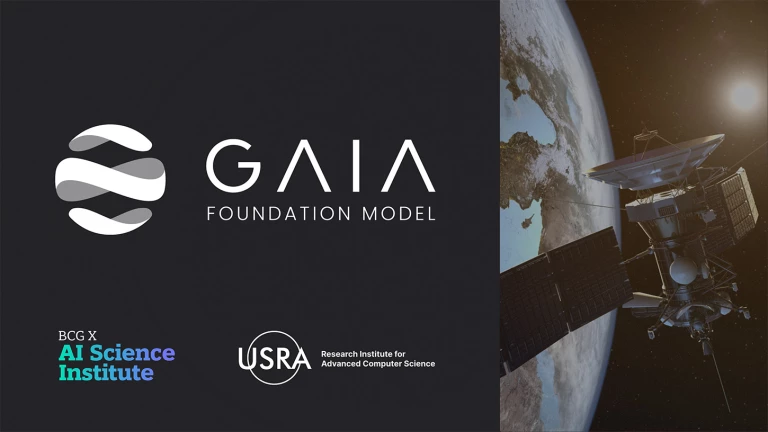May 29, 2025 | New at BCG

BOSTON—BCG X AI Science Institute and the Universities Space Research Association (USRA)'s Research Institute for Advanced Computer Science (RIACS), today announced the open-source release of GAIA Foundation Model, built in collaboration with the National Aeronautics and Space Administration (NASA). GAIA (Geospatial Artificial Intelligence for Atmospheres) Foundation Model is a novel GenAI model trained on 25 years of global satellite data from an international consortium that includes the Geostationary Operational Environmental Satellites (GOES), Europe’s Meteosat (EUMETSAT), and Japan’s Himawari satellite.
This marks a major milestone of the collaboration formed in April 2024 to pioneer AI for science and engineering and deepen understanding of geospatial generative AI applications.
“GAIA Foundation Model is a working example of what happens when cutting-edge AI engineering is applied to the scientific frontier,” said GAIA project co-lead for BCG X, Arun Ravindran, partner and vice president, and BCG X chief data scientist. “This is distributed AI at scale—designed to be replicated, extended, and applied across environmental challenges in Earth science and beyond.”
Developed using a distributed training orchestration framework, GAIA Foundation Model was trained entirely on graphics processing unit (GPU) sources of USRA and the National Research Platform (NRP), a National Science Foundation (NSF) funded network of high-performance university resources across the United States. The team leveraged open source technologies to ensure maximum portability and resilience within a cloud environment.
Training was deployed on the National Research Platform (NRP), leveraging 88 high-performance GPUs and over 15 terabytes (TBs) of satellite imagery to complete approximately 100,000 training steps. GAIA Foundation Model rivals highly specialized alternatives, achieving state-of-the-art results in reconstruction and gap-filling tasks with super-resolution capabilities—delivering a spatial resolution of four kilometers and a temporal resolution of 30 minutes.
“Reliable, continuous satellite observation of Earth is essential to many real-world systems—hurricane prediction, wildfire detection, and safe aircraft routing are just a few examples,” said managing director and partner and GAIA project co-lead at BCG X, David Potere. “What’s remarkable about the new class of Earth imagery-based foundation models is their uncanny ability to tackle many of these divergent problems in one go. GAIA Foundation Model is no exception. In one model we are seeing promising abilities in both seamlessly patching large gaps in the satellite record while also translating that imagery into precipitation estimates. For the scientists and meteorologists monitoring our weather systems, models like GAIA are an exciting new potential avenue to deliver more timely and informed decisions.”
“GAIA represents a new class of novel geospatial AI models with the power to drive significant impact across sectors. From more accurate weather forecasting to real-world applications in insurance, power utilities, aviation, and agriculture, this technology is reshaping what’s possible,” said Adi Zolotov, BCG X AI Science Institute global leader.
Moving forward, the partnership will focus on producing a new wave of downstream meteorology-related applications powered by larger scale implementations, as well as other opportunities to apply this scalable and flexible GenAI model in additional domains.
To learn more about GAIA Foundation Model, read the team’s paper published on arXIv.
GAIA Foundation Model is available for download on Hugging Face.
Media Contact:
Eric Gregoire
gregoire.eric@bcg.com
About BCG X
BCG X is the tech build & design unit of BCG.
Turbocharging BCG’s deep industry and functional expertise, BCG X brings together advanced tech knowledge and ambitious entrepreneurship to help organizations enable innovation at scale.
With nearly 3,000 technologists, scientists, programmers, engineers, and human-centered designers located across 80+ cities, BCG X builds and designs platforms and software to address the world’s most important challenges and opportunities. Teaming across our practices, and in close collaboration with our clients, our end-to-end global team unlocks new possibilities.
Together we’re creating the bold and disruptive products, services, and businesses of tomorrow.
About Boston Consulting Group
Boston Consulting Group partners with leaders in business and society to tackle their most important challenges and capture their greatest opportunities. BCG was the pioneer in business strategy when it was founded in 1963. Today, we work closely with clients to embrace a transformational approach aimed at benefiting all stakeholders—empowering organizations to grow, build sustainable competitive advantage, and drive positive societal impact.
Our diverse, global teams bring deep industry and functional expertise and a range of perspectives that question the status quo and spark change. BCG delivers solutions through leading-edge management consulting, technology and design, and corporate and digital ventures. We work in a uniquely collaborative model across the firm and throughout all levels of the client organization, fueled by the goal of helping our clients thrive and enabling them to make the world a better place.
About the Universities Space Research Association (USRA)
Founded in 1969, under the auspices of the National Academy of Sciences at the request of the U.S. Government, the Universities Space Research Association (USRA) is a nonprofit corporation chartered to advance space-related science, technology, and engineering. USRA conducts major research and educational programs, and operates premier facilities by involving universities, governments and the private sector for the benefit of humanity. USRA is an association with 121 university members. It engages the broader university community, employs in-house scientific talent, and offers innovative research, development, and project management expertise. More information about USRA is available at www.usra.edu.
About USRA’s Research Institute for Advanced Computer Sciences (RIACS)
USRA’s Research Institute for Advanced Computer Science (RIACS) was founded in 1983 as an independent research institute. Since its inception, RIACS has conducted research on artificial intelligence (AI), high-performance computing (HPC), and human-computer interfaces (HCI) for aerospace-related use cases, and has a 40+ year history of major achievements in collaboration with NASA. RIACS operates a GenAI Lab for Science & Engineering, which engages academia, industry, and government to advance GenAI solutions for the benefit of humanity.
© 2025 Universities Space Research Association
425 3rd Street SW, Suite 950, Washington, DC, 20024